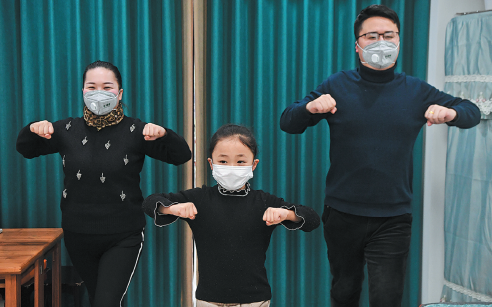
From the People's Daily App.
This is Story in the Story.
With dynamic music playing, 32-year-old Wang Mengshi was dancing and waving his phone to follow the moves of the electronic dancer on the 65-inch TV in his apartment.
In Lanzhou, capital of northwest China's Gansu Province, the white-collar worker Wang was playing a fitness-based video game called Just Dance while being quarantined at home.
Following the novel coronavirus outbreak, Chinese people across the country are advised to comply with home quarantine measures and avoid public events and social gatherings. Young people in China, including Wang, have found a way to work out through video games.
Wang said that he now preferred to stay home and keep fit rather than go to coffee shops with his friends on weekends as usual. And he had ordered new portable game consoles online.
"I spend the whole weekend just standing in front of the TV and dancing to video games instead of going outside," he said.
Today’s Story in the Story looks at how innovation has been helping conquer boredom at home.

Wu Yucan does a spinning workout at her home in Chongqing on Feb 6. (Photo: XINHUA)
Over the past few weeks, another video game named Ring Fit Adventure for Nintendo's handheld gaming system Switch, which comes with a controller with gesture-based technology known as a Ring-con, has also become popular.
In early February, Nintendo said in a statement that the sales of Switches are still increasing in 2020. And the sales of Switches are expected to increase from 18 million to 19.5 million devices before April.
However, the manufacturing and transportation of Switches and Ring-cons have been affected by the outbreak. The unit price of Ring-cons has more than doubled to nearly 2,000 yuan (about $285) recently as most online merchants are out of stock in China.
"It seems that a century has passed and my Switch and Ring-con are still on the way," Wang said.
A big television and a video game device are necessities for some. For those without any video game devices, a smartphone is a must-have.
Liu Zhen, a 28-year-old clothing store owner, plays a video game named Gym Simulator on her phone. In this game, she goes to a gym in a first-person perspective. Just like in a real gym, she can exercise with all kinds of equipment
"For me, it's a good way to practice with a smartphone during home quarantine. Video games on my smartphone make fitness no longer boring. I often share fitness videos with my friends these days," Liu said.

A family in Chongqing exercises at home. (Photo: XINHUA)
Industry insiders have pointed out that the sales of fitness-based video games and other digital facilities have brought the industry tremendous development.
A report on China's game industry showed that the marketing revenue of E-sports games was 94.73 billion yuan last year, up 13.5 percent year on year. The scale of video game users has been expanding for five consecutive years to 440 million in 2019.
"Recently, young people staying home can keep fit by pressing the buttons on their controllers. Video games will be a new trend for young people to entertain themselves," said Ren Shangren, a video game designer with Beijing Kwai Technology Co.
As people have had limited contact with friends and neighbors, the use of cyberspace has surged.
As former Morgan Stanley employee Duncan Clark writes in his book Alibaba: The House That Jack Ma Built, "SARS validated digital mobile telephony and the internet, and so came to represent the turning point when the internet emerged as a truly mass medium in China."
Wang Jianhui, a media and internet analyst at Cinda Securities, said," During the outbreak, the online entertainment sector, dominated by games and streaming services, has seen a welcome boom.
With the central government suggesting that people stay at home to avoid further spreading the virus, lifestyles have moved increasingly from offline to online across China.
(Produced by Nancy Yan Xu, Brian Lowe, Lance Crayon and Da Hang. Music by bensound.com. Text from Xinhua and China Daily.)


